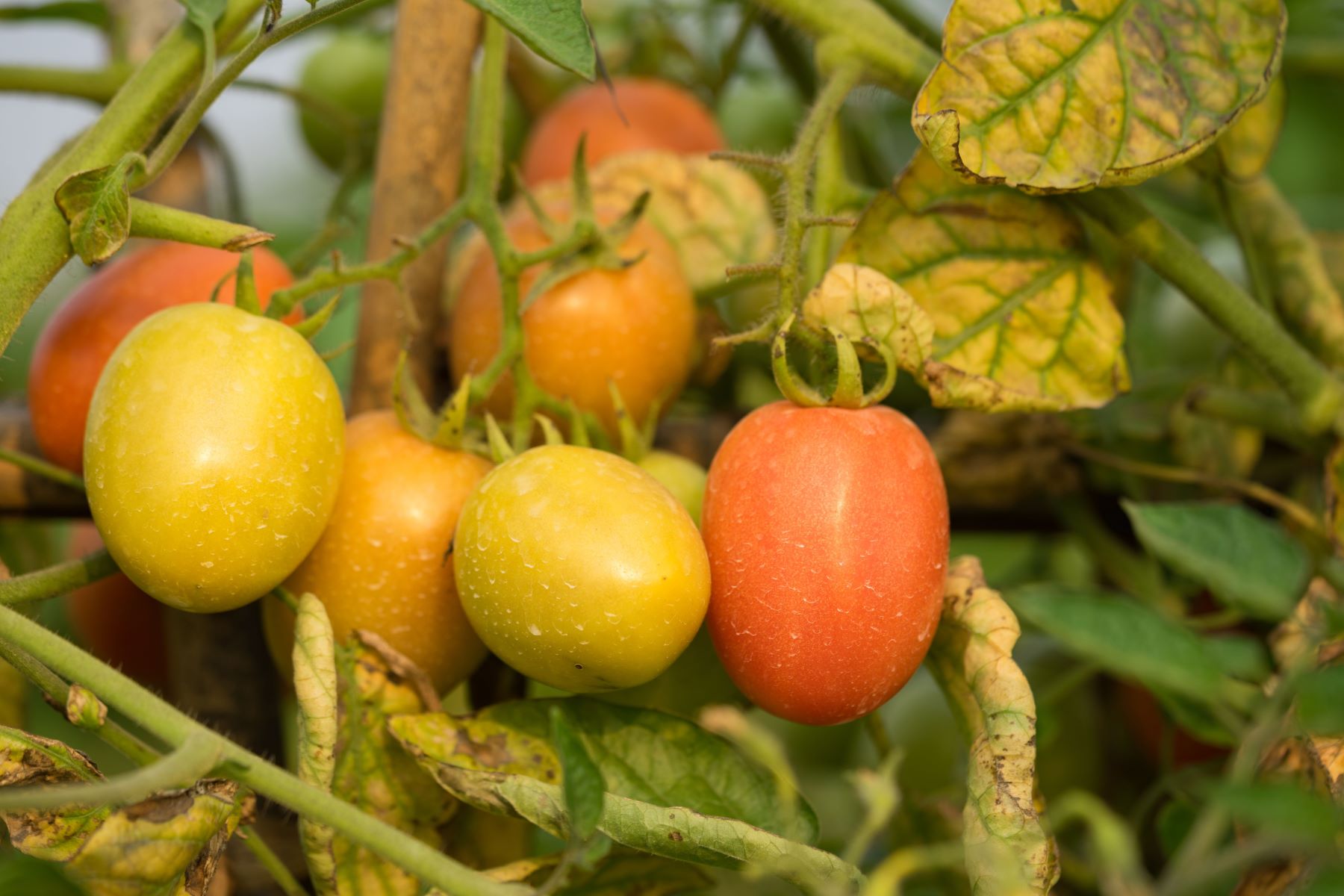Home>Food and Cooking>Boost Your Tomato Growth With Calcium-Infused Soil


Food and Cooking
Boost Your Tomato Growth With Calcium-Infused Soil
Published: January 18, 2024
Enhance your tomato growth with calcium-infused soil. Discover expert tips and techniques for food and cooking enthusiasts. Unlock the secret to thriving tomato plants!
(Many of the links in this article redirect to a specific reviewed product. Your purchase of these products through affiliate links helps to generate commission for Regretless.com, at no extra cost. Learn more)
Table of Contents
Introduction
Tomatoes are a beloved staple in many gardens and kitchens, prized for their juicy texture and vibrant flavor. Whether you're a seasoned gardener or a novice enthusiast, understanding the crucial role of calcium in tomato growth is key to cultivating robust, healthy plants and bountiful harvests.
Calcium plays a pivotal role in the development of tomatoes, contributing to cell wall structure and strength. Insufficient calcium can lead to various issues, including blossom end rot, a common disorder characterized by dark, sunken lesions at the blossom end of the fruit. By infusing your soil with calcium, you can fortify your tomato plants, bolster their resilience, and enhance the quality of the fruits they yield.
In this comprehensive guide, we will delve into the significance of calcium in tomato growth, provide insights on testing soil for calcium levels, explore effective methods for infusing soil with calcium, and offer best practices for utilizing calcium-infused soil to maximize tomato growth. Whether you're aiming to revitalize lackluster plants or elevate the productivity of thriving ones, this guide will equip you with the knowledge and techniques to optimize your tomato cultivation.
With the right approach and understanding, you can harness the power of calcium to nurture robust, thriving tomato plants that yield an abundance of flavorful, succulent fruits. Let's embark on this journey to unlock the potential of your tomato garden through the transformative influence of calcium-infused soil.
Understanding the Role of Calcium in Tomato Growth
Calcium serves as a fundamental building block in the growth and development of tomato plants, exerting a profound influence on their overall health and productivity. As an essential nutrient, calcium plays a multifaceted role in various physiological processes within the plant, particularly during the crucial stages of fruit formation and maturation.
Cell Wall Structure and Strength
One of the primary functions of calcium in tomato plants is its contribution to the formation and fortification of cell walls. As tomatoes grow and mature, the structural integrity of their cells is heavily reliant on adequate calcium availability. Calcium ions are integral in binding pectic substances within the cell walls, thereby enhancing their strength and rigidity. This fortification is vital in providing structural support to the developing fruits, minimizing the risk of deformities and ensuring optimal fruit quality.
Disease Resistance
In addition to its role in strengthening cell walls, calcium also plays a pivotal role in bolstering the plant's resilience against various diseases and physiological disorders. Adequate calcium levels contribute to the activation of defense mechanisms within the plant, fortifying its ability to withstand environmental stressors and combat pathogens. Notably, calcium deficiency in tomato plants can lead to the development of blossom end rot, a prevalent disorder characterized by dark, sunken lesions at the blossom end of the fruits. By maintaining optimal calcium levels, growers can mitigate the risk of such afflictions, promoting healthier and more robust plants.
Nutrient Transport
Furthermore, calcium facilitates the efficient transport of other essential nutrients within the plant, ensuring proper metabolic functions and physiological processes. By regulating the movement of nutrients, calcium contributes to the overall vitality and vigor of the tomato plant, optimizing its capacity to assimilate and utilize vital elements for growth and development.
Fruit Development and Shelf Life
The influence of calcium extends beyond the plant's physiological processes, encompassing the quality and longevity of the harvested fruits. Adequate calcium levels during fruit development can enhance the firmness and texture of the tomatoes, contributing to their visual appeal and marketability. Moreover, calcium plays a pivotal role in extending the shelf life of harvested tomatoes, minimizing post-harvest deterioration and preserving their freshness.
In essence, the significance of calcium in tomato growth cannot be overstated. From fortifying cell walls to enhancing disease resistance and improving fruit quality, calcium stands as a linchpin in nurturing healthy, productive tomato plants. By comprehending the multifaceted role of calcium in tomato growth, growers can implement targeted strategies to optimize calcium availability and harness its transformative impact on their tomato cultivation endeavors.
Testing Your Soil for Calcium Levels
Assessing the calcium levels in your soil is a pivotal step in understanding its suitability for cultivating calcium-sensitive plants such as tomatoes. By conducting a thorough analysis, you can gain valuable insights into the existing calcium content, enabling informed decisions regarding the supplementation of calcium to optimize plant health and productivity.
Soil Testing Methods
There are several approaches to assess soil calcium levels, each offering unique advantages and insights. One of the most common methods is utilizing a soil testing kit, which typically includes test strips or reagents designed to detect the presence and concentration of calcium ions in the soil. These kits are user-friendly and provide rapid results, allowing growers to swiftly ascertain the calcium status of their soil.
Alternatively, professional soil testing services offered by agricultural extension offices or private laboratories offer comprehensive analyses of soil composition, including calcium levels. Through these services, growers can obtain detailed reports outlining the calcium content alongside other essential parameters, empowering them with in-depth knowledge to tailor their soil management strategies effectively.
Importance of pH Levels
In addition to directly measuring calcium levels, evaluating the pH of the soil is integral to comprehensively understanding its calcium availability. Soil pH profoundly influences the solubility and accessibility of calcium to plants. Acidic soils, characterized by low pH levels, often exhibit reduced calcium availability, potentially necessitating corrective measures to optimize calcium uptake by plants. Conversely, alkaline soils may pose challenges related to excessive calcium, necessitating pH management to ensure balanced nutrient availability.
Interpretation and Action
Upon obtaining the soil test results, it is crucial to interpret the findings in the context of optimal calcium levels for tomato cultivation. While specific calcium requirements may vary based on factors such as soil type and environmental conditions, general guidelines recommend maintaining adequate calcium levels, typically in the range of 1000-2000 pounds per acre for optimal tomato growth.
If the soil test reveals suboptimal calcium levels, implementing targeted interventions to supplement calcium becomes imperative. This may involve the application of calcium-containing soil amendments such as gypsum or agricultural lime, tailored to rectify calcium deficiencies and enhance the overall soil fertility.
By diligently assessing the calcium levels in your soil and factoring in the influence of soil pH, you can proactively address any deficiencies and create an environment conducive to robust tomato growth. Armed with a comprehensive understanding of your soil's calcium status, you can embark on the next phase of enhancing your soil with calcium to unlock the full potential of your tomato plants.
Methods for Infusing Your Soil with Calcium
When it comes to infusing your soil with calcium to optimize the growth of tomato plants, several effective methods can be employed to bolster the calcium content and create an environment conducive to robust plant development. These methods are geared towards enhancing the soil's capacity to deliver essential calcium to the plants, thereby fortifying their structural integrity and overall health. Here are some key approaches for infusing your soil with calcium:
1. Incorporating Calcium-Rich Organic Amendments
Integrating organic materials renowned for their high calcium content is a potent strategy for fortifying the soil with this vital nutrient. Agricultural gypsum, a calcium sulfate compound, stands out as a valuable amendment for increasing soil calcium levels. When applied to the soil, gypsum dissolves gradually, releasing calcium ions that become readily available to the plants. Additionally, materials such as crushed eggshells, bone meal, and limestone can be incorporated into the soil to augment its calcium reserves, fostering a conducive environment for robust tomato growth.
2. Utilizing Calcium-Fortified Fertilizers
Selecting fertilizers enriched with calcium presents an efficient means of supplementing the soil with this essential nutrient. Calcium-fortified fertilizers, often formulated with compounds like calcium nitrate or calcium carbonate, offer a targeted approach to delivering calcium to the plants while simultaneously addressing other nutritional requirements. By incorporating these fertilizers into the soil regimen, growers can ensure a consistent supply of calcium, promoting optimal plant development and mitigating the risk of calcium deficiencies.
3. Implementing Foliar Applications
Employing foliar sprays containing calcium compounds represents a direct and expedient method of delivering calcium to tomato plants. These sprays, formulated with water-soluble calcium sources such as calcium nitrate, can be applied to the foliage, allowing for rapid absorption and assimilation by the plants. Foliar applications offer the advantage of circumventing potential soil-based limitations on calcium availability, providing an immediate boost to the plants' calcium reserves and fortifying their cellular structures.
4. Amending Soil pH for Enhanced Calcium Availability
Modifying the soil pH to optimize calcium availability is a strategic approach to ensuring that the plants can effectively access this crucial nutrient. As mentioned earlier, soil pH profoundly influences calcium solubility, with acidic soils often exhibiting reduced calcium availability. By adjusting the pH through the application of agricultural lime, growers can create a more hospitable environment for calcium uptake by the plants, thereby fostering robust growth and minimizing the risk of calcium-related disorders.
By strategically implementing these methods, growers can effectively infuse their soil with calcium, creating an environment conducive to the vigorous growth and development of tomato plants. Each approach offers unique benefits and can be tailored to suit specific soil conditions and cultivation practices, empowering growers to optimize calcium availability and maximize the potential of their tomato cultivation endeavors.
Best Practices for Using Calcium-Infused Soil
Upon infusing your soil with calcium to optimize the growth of tomato plants, adhering to best practices is essential to maximize the efficacy of this nutrient enhancement and ensure the robust development of your crops. By implementing the following best practices, you can harness the full potential of calcium-infused soil and cultivate thriving, productive tomato plants.
1. Strategic Application Timing
Strategically timing the application of calcium-infused soil amendments is crucial to align with the plants' developmental stages and optimize calcium uptake. Incorporating calcium-rich amendments during soil preparation or at the onset of the growing season allows the plants to access this vital nutrient as they establish their root systems, fostering strong foundational growth and resilience.
2. Uniform Distribution
Ensuring the uniform distribution of calcium-infused soil amendments throughout the growing area is paramount to facilitate consistent calcium availability to the plants. Thoroughly incorporating calcium-rich materials into the soil and employing appropriate mixing techniques promotes equitable dispersion, preventing localized deficiencies and promoting uniform plant development.
3. Monitoring and Adjusting pH Levels
Continual monitoring of soil pH levels following the infusion of calcium is essential to sustain optimal calcium availability. Regular assessment and adjustment of soil pH, particularly in response to fluctuations caused by environmental factors or ongoing cultivation practices, safeguard against imbalances that may compromise calcium uptake by the plants.
4. Integrated Nutrient Management
Integrating calcium-infused soil management within a comprehensive nutrient management strategy is pivotal to optimize plant nutrition and overall health. Considering the interplay of various essential nutrients and their synergistic effects on plant growth, aligning calcium supplementation with other nutrient applications ensures a harmonized approach that supports holistic plant development.
5. Observing Plant Responses
Vigilantly observing the responses of the tomato plants to the calcium-infused soil is indispensable in gauging the efficacy of the supplementation. Monitoring the plants for signs of improved vigor, reduced incidence of calcium-related disorders, and enhanced fruit quality serves as a valuable gauge of the soil's calcium status and aids in refining the application strategies for sustained benefits.
6. Sustainable Soil Management
Embracing sustainable soil management practices, such as organic soil amendments and conservation-oriented cultivation techniques, complements the integration of calcium-infused soil strategies. By nurturing a balanced and resilient soil ecosystem, growers can fortify the long-term efficacy of calcium supplementation, fostering enduring benefits for successive growing seasons.
By conscientiously implementing these best practices, growers can optimize the utilization of calcium-infused soil, fostering the robust growth and productivity of their tomato plants. Embracing a holistic approach that encompasses strategic application, vigilant monitoring, and sustainable soil stewardship empowers growers to leverage the transformative potential of calcium-infused soil and cultivate thriving, bountiful tomato harvests.
Conclusion
In conclusion, the pivotal role of calcium in the growth and development of tomato plants cannot be overstated. By fortifying cell walls, enhancing disease resistance, and optimizing fruit quality, calcium serves as a linchpin in nurturing robust, productive tomato plants. Through a comprehensive understanding of the multifaceted influence of calcium, growers can implement targeted strategies to optimize calcium availability and harness its transformative impact on their tomato cultivation endeavors.
Testing the soil for calcium levels provides invaluable insights into its suitability for cultivating calcium-sensitive plants, enabling growers to make informed decisions regarding the supplementation of calcium to optimize plant health and productivity. By assessing soil pH alongside calcium levels, growers can gain a holistic understanding of the soil's calcium availability and tailor their supplementation strategies accordingly.
Infusing the soil with calcium presents a myriad of effective methods, ranging from incorporating calcium-rich organic amendments to utilizing calcium-fortified fertilizers and implementing foliar applications. Each approach offers unique benefits and can be tailored to suit specific soil conditions and cultivation practices, empowering growers to optimize calcium availability and maximize the potential of their tomato cultivation endeavors.
Adhering to best practices for using calcium-infused soil is essential to maximize the efficacy of this nutrient enhancement and ensure the robust development of tomato crops. Strategic application timing, uniform distribution, continual monitoring of pH levels, integrated nutrient management, vigilant observation of plant responses, and sustainable soil stewardship collectively contribute to the successful utilization of calcium-infused soil, fostering thriving, bountiful tomato harvests.
In essence, by embracing the significance of calcium and implementing targeted strategies to optimize its availability, growers can unlock the full potential of their tomato plants, nurturing healthy, resilient crops that yield an abundance of flavorful, succulent fruits. With the transformative influence of calcium-infused soil, the journey to cultivating thriving tomato plants becomes a rewarding and fulfilling endeavor, culminating in the gratifying harvest of luscious, vibrant tomatoes that embody the culmination of meticulous care and strategic soil stewardship.










